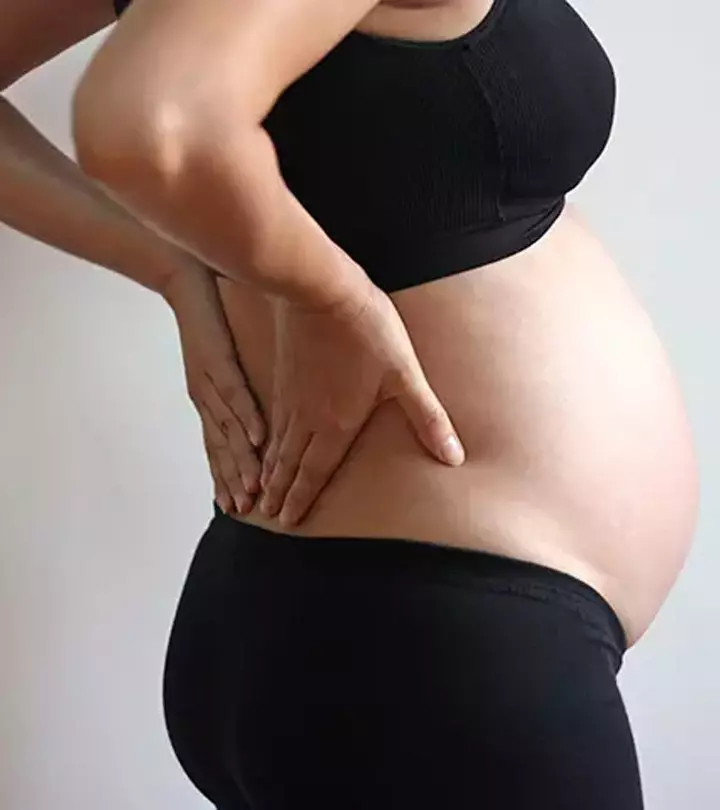
iStock
The nine months of pregnancy can give a haul of wild and wonderful time to the moms-to-be. The body goes through several changes as the baby grows, giving rise to aches, pains and discomforts. The aches and pains are not only uncomfortable, but also very annoying. Some can even surface as you are approaching the delivery date. Backache and swollen legs are two most common complaints among pregnant women. Below are a few ways to handle them.
Back Pain
Back pain is experienced by 50 to 70% of pregnant women at some point of their gestation period. The pain usually occurs during the later stages as the baby grows. Let’s look at the potential causes of back pain during pregnancy:
1. Increase in the hormones:
During pregnancy, the ligaments in the pelvic become soft and stretchable to prepare the body for labor. This puts a strain on the pelvis and joints of the lower back, causing backache.
2. Moving Of Center Of Gravity:
The center of gravity gradually moves forward as the baby and uterus grow causing change in posture.
3. Obesity:
The development of the child results in additional weight that the back has to support.
4. Poor Posture:
Poor position or posture, excessive standing or bending over can exacerbate the pain one experiences in the back.
5. Stress:
Stress accumulates in the weaker areas of the body, increasing the back pain during the stressful periods of the pregnancy.
How To Avoid Backache During Pregnancy?
It’s tough to prevent the back pain entirely. But you can manage it. Below are a few steps you can take to reduce the trouble:
- Do not bend over to pick something up. Squat and keep the back straight when picking something from the floor.
- Move the feet while turning around to avoid twisting of the spine.
- Do not lift heavy objects.
- Do not wear high heels or any other shoes that do not provide good support. Flat shoes are recommended as they allow the weight to be evenly distributed.
- Your back should be straight and supported while sitting.
- The surface area for working should be high enough to prevent you from stooping.
- Do not sleep straight on the back.
- Perform exercises that support and strengthen the abdomen and back. But it must be approved by the healthcare provider.
- You can wear a support belt under the lower abdomen.
- Take plenty of rest. Elevate your feet while resting. It will be good for your back.
Other interventions
Here are a few other interventions:
- Support devices or braces
- Heat or ice
- Sleep on your left side and use support pillows under the knees.
When To Contact The Health Care Provider?
Contact your gynecologist if you are experiencing any of the following:
- An abrupt onset of backache
- Severe backache as it could be related to pregnancy-associated osteoporosis, septic arthritis or vertebral osteoarthritis.
- Rhythmic cramping as it could be a sign of preterm labor.
Swelling During Pregnancy
Feet, ankles, and fingers are often swollen during pregnancy because the body holds more water than it normally does. Towards the end of the day, water gathers in the lower parts of the body, causing swelling of the feet. This is not harmful, but can be very uncomfortable.
Here are a few steps you can take for avoiding swelling during pregnancy. It will ease the discomfort if your ankles, legs, and feet are swollen already.
- Do not stand for long periods.
- Wear comfortable shoes. Avoid shoes with closed straps or anything that can pinch if your feet swell.
- Try to keep your feet up as long as you can. Every day, rest an hour with feet higher than your heart.
Exercises
Exercises can go a long way in reducing swelling. They improve blood circulation, thereby reducing the swelling of the legs and preventing cramp in the calf muscles.
- Stretch and bend the feet up and down 25 to 30 times.
- Rotate your feet in a circle ten times one way and ten times the other.
When Can Swelling Be Serious?
You must seek immediate attention if your feet, face or hands swell up suddenly. This condition is called pre-eclampsia. If you notice this condition, contact your doctor, midwife or hospital immediately. In the case of pre-eclampsia, you will be monitored carefully, as this condition can be grave for both you and your baby. The other signs of pre-eclampsia are:
- Blurry vision or flashing before the eyes
- Vomiting
- Severe headache
- Severe pain below the ribs
Risk Factors For Pre-Eclampsia Include:
- A 10-year gap since the last pregnancy
- Being aged 40 or older
- A family history of pre-eclampsia
- A BMI of 30 or above
- Kidney diseases
- High blood pressure
- Multiple pregnancy
We hope you find our post helpful. If you have any queries or want to share your experience, leave us a comment below.













